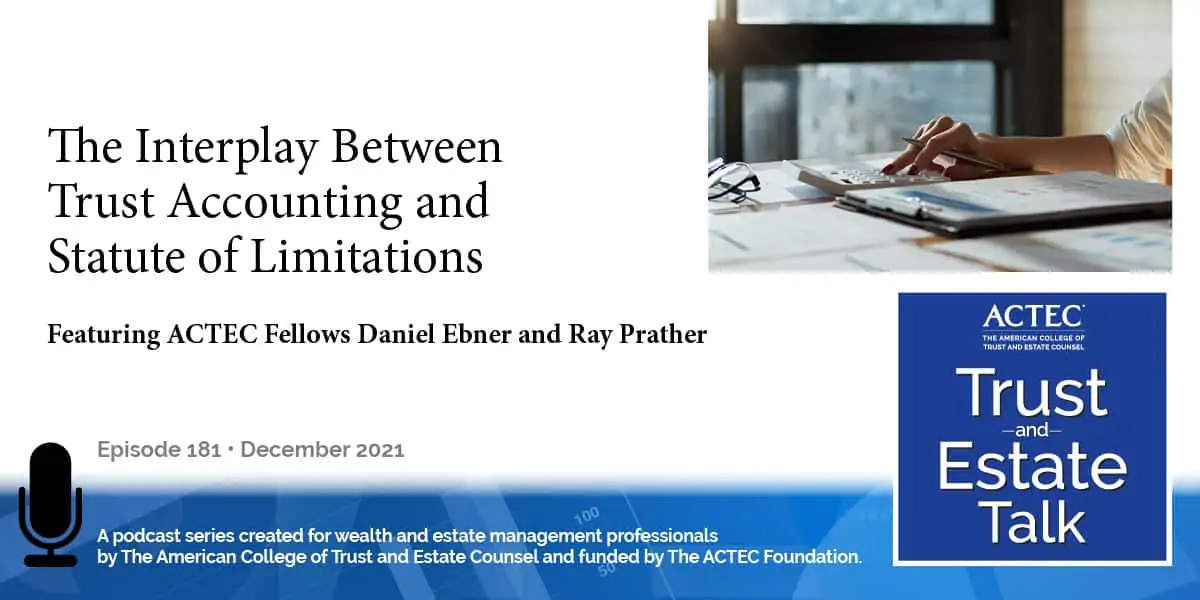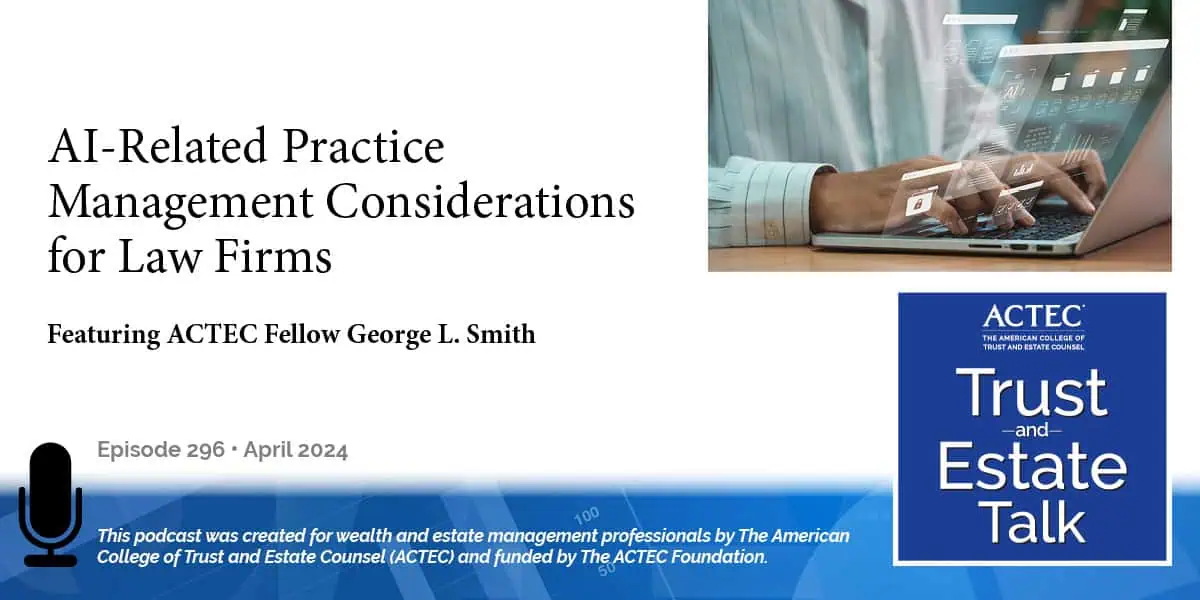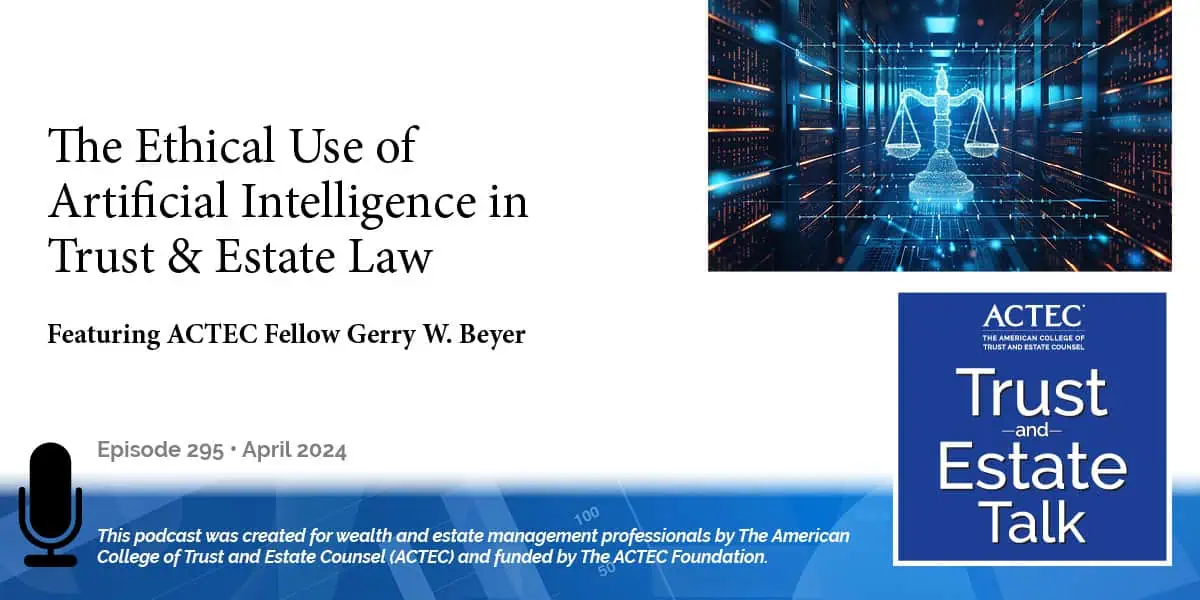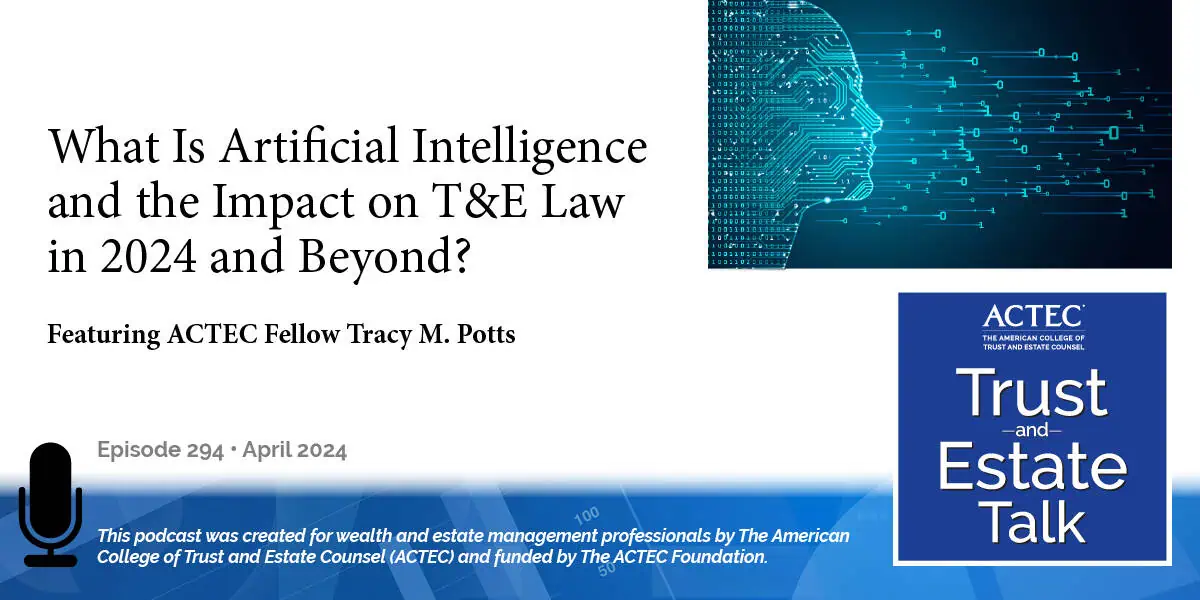The Interplay Between Trust Accounting and Statute of Limitations

“The Interplay Between Trust Accounting and Statute of Limitations,” that’s the subject of today’s ACTEC Trust and Estate Talk.
Transcript/Show Notes
This is Stacy Singer, ACTEC Fellow from Chicago, Illinois. Attorneys prepare and review trust accounting all the time, but there are special considerations for attorneys for both the trustee and the beneficiaries when there is possible litigation. Today you will be hearing from ACTEC Fellows Dan Ebner and Ray Prather, both from Chicago. Welcome Dan and Ray.
Thanks, Stacy. So, Ray, let’s start with the basics. Why should a trustee account?
Why Should a Trustee Account?
Well, in short, the duty to inform is a common law duty that requires all trustees to provide information about the trust. If you are a UTC (Uniform Trust Code) state, Section 813 specifically requires some sort of report to the beneficiaries. And I’ll note that under the common law I think at one time it was important that the accounting be some sort of formal thing that’s shown, but when you get to the UTC, they’ve actually changed the requirement from an account to a report. And that is because they wanted to decrease the emphasis on the formality and how the accounting looks, and place more of the emphasis on the information that’s provided.
So, in addition to it being required by law, it’s also just a good idea to account because, when you come to damages it really starts to be a liability that trustee might have. It starts the limitation period on anything that’s disclosed in the report or the account. So, now this limitation period differs by jurisdiction, but it does start the running of that limitations.
Why Would a Trustee Choose Not to Account?
And I guess with those reasons to account, Dan, why would a trustee choose not to account?
Well, Ray, the classic tension with Rule 813 is that certain aspects of it are mandatory for qualified beneficiaries, but a grantor may want the beneficiaries to know about – as little as possible about – their beneficial interest. And so, the grantor may have tried to restrict the amount of information that the trustee is required to provide to beneficiaries or may have given – expressed a wish to a trustee not to provide beneficiaries with a full scope of information about their beneficial interest.
And also, giving information to non (sort of) mandatory beneficiaries, to non-qualified beneficiaries, who don’t necessarily need to get the information could empower some problematic ones to cause problems earlier than they otherwise would when they get reports.
But not providing the information can put the trustee in a real bind because it limits the trustee’s ability to take advantage of the shorter limitations period of Section 1005 by putting the beneficiaries on notice of the trustee’s actions. And it also allows problems to fester. So, an issue that maybe would be easy to cure if someone had raised it early on, can turn into a huge problem years down the line when that beneficiary finally gets information about what had been going on.
So, there are reasons that maybe a trustee wouldn’t want to provide information on an annual basis to every possible beneficiary of the trust, but there’s some tension with the trustee’s goal of resolving problems as quickly as possible or getting a time limitation on claims based on those issues.
How to Avoid Trustee Accounting Problems
And what would be required to be disclosed to avoid some of those problems?
So, that’s a little unclear. The statute says any report that adequately disclosed the existence of a potential claim for breach of trust and inform the beneficiary of the time allowed for commencing a proceeding. So, the language itself of the statute, as you noted earlier, certainly deemphasizes formality, and emphasizes simply providing the information.
The case law is a little all over the place. A little bit of case law says that actual notice is all that’s required. But there is other case law that says that the trustee needs to strictly comply with the notice and delivery provisions. So, the specific beneficiary that you want to be time barred needs to actually have had the accounting delivered to them or their agent as opposed to simply having access to it, maybe through a relative or through some other third party or other beneficiary.
As far as details, the case law does interpret the provision in a variety of ways. And some cases require greater specificity and some cases require less specificity. So, it really is (can be) a little bit hard to say exactly where the limits are on what the nature of what should be disclosed is. But the language of the statute itself is pretty broad in terms of simply informing the trustee – or informing the beneficiary of the actions the trustee has taken.
What Should a Beneficiary Look for in an Accounting Report?
So, Ray, once the beneficiary receives some sort of a report, what should the beneficiary be looking for to determine potential claims and damages?
There’s usually a lot of information that’s provided in the report. And it’s important to come up with a systematic way of looking at it from multiple angles. And so, whether that’s a checklist or some other system that you create, it’s important to go through it and make sure that you are analyzing it from a variety of directions. It’s important to look at the principal in income. One, you can check to make sure the distributions are classified properly and no one person is paying more in expenses than another beneficiary.
The other option when looking at it from principal in income is the investment angle, and were the funds invested properly under your state statutes for prudent investing. And then even with that you have class – you can classify the various documents in a way that allows you to more clearly see what the cost of administering the trust is.
So, if you classify things according to their purpose, you can create different columns of expenses and differentiate administrative costs versus the fees for the fiduciaries and their agents and versus what the amount of the distributions were. And even after you’ve classified everything, add it up. Make sure that it’s a reasonable number. And then after, if that’s a reasonable number, look at what the percentage of that number is of the total trust to see whether it’s a reasonable percentage.
So, there are a variety of ways of looking at it and it’s just important to come up with some system that you use consistently to look at all these different angles.
Beneficiary Approvals, Actions and Leverage for Accounting
And then, Dan, I guess if you want to finish this off, what about sort of releases and ratifications of trustee actions that’s disclosed in the account? Is that allowed, and how do you do that?
So, the UTC allows, under Section 1009, allows a trustee to obtain consents, releases or ratifications from a beneficiary. And to prevent them obtaining that will prevent the beneficiary from later challenging the action. So, if there is some sort of an administrative action that the trustee is considering taking, it can be a good policy can be, to consider whether or not the beneficiary’s approval should be obtained before taking the action. And 1009 also allows the approval to be obtained after taking the action.
The trustee may also want to condition a distribution on receiving a release. And the UTC explicitly allows a final distribution to be conditioned on the receipt, approval of accountings and the receipt of a release. For interim distributions there’s no specific provision that allows a trustee to withhold a mandatory interim distribution. But a good practice, I think, is for the trustee to hold back at least some funds in the case of making a large interim distribution. Some of that interim distribution can be held back pending other administrative activities, which could include collecting approval of an accounting from a beneficiary or something along those lines.
So, although the UTC doesn’t explicitly allow it, I think there are ways to still maintain a little bit of leverage to try and get a release in relation to making an interim distribution, as well as a final distribution that’s explicitly allowed under the Uniform Trust Code.
Thank you, Dan and Ray. That was really great in helping us to better understand how to review and both prepare and review trust accounting.
You may also be interested in:
This podcast was produced by The American College of Trust and Estate Counsel, ACTEC. Listeners, including professionals, should under no circumstances rely upon this information as a substitute for their own research or for obtaining specific legal or tax advice from their own counsel. The material in this podcast is for information purposes only and is not intended to and should not be treated as legal advice or tax advice. The views expressed are those of speakers as of the date noted and not necessarily those of ACTEC or any speaker’s employer or firm. The information, opinions, and recommendations presented in this Podcast are for general information only and any reliance on the information provided in this Podcast is done at your own risk. The entire contents and design of this Podcast, are the property of ACTEC, or used by ACTEC with permission, and are protected under U.S. and international copyright and trademark laws. Except as otherwise provided herein, users of this Podcast may save and use information contained in the Podcast only for personal or other non-commercial, educational purposes. No other use, including, without limitation, reproduction, retransmission or editing, of this Podcast may be made without the prior written permission of The American College of Trust and Estate Counsel.
If you have ideas for a future ACTEC Trust & Estate Talk topic, please contact us at ACTECpodcast@ACTEC.org.
© 2018 – 2024 The American College of Trust and Estate Counsel. All rights reserved.
Latest ACTEC Trust and Estate Talk Podcasts

AI-Related Practice Management Considerations for Law Firms
A discussion for law firms about how to incorporate AI in their practice management, including staff considerations, the “billable hour,” and more.

The Ethical Use of Artificial Intelligence in Trust & Estate Law
A law professor offers insights into the risks, rewards, duties and ethical considerations of lawyers using AI in their T&E practices.

What Is Artificial Intelligence and the Impact on T&E Law in 2024 and Beyond?
A primer on the types and uses of AI, then a deeper dive into the impact on trust and estate law from types to applications to ethical considerations.

